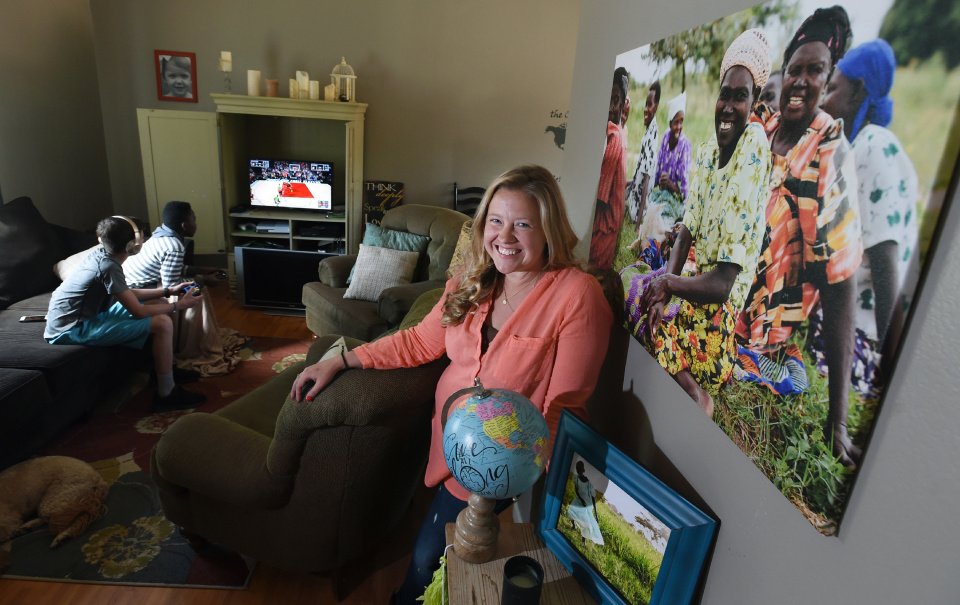By Chhun Sun
The Gazette (Colorado Springs, Colo.)
WWR Article Summary (tl;dr) Today, more than 1,150 women — along with 6,500 children across Ugandan villages through 37 women’s cooperatives receive resources through Brandi Lea’s organization “Beauty for Ashes Uganda.” The organization asks for a donation of $23 a month to help change the lives of the women, who can borrow from the fund to start their own businesses.
The Gazette (Colorado Springs, Colo.)
On the walls of Brandi Lea’s Colorado Springs home are pictures of her “mamas.”
That’s what she calls the women she helps through her nonprofit Beauty for Ashes Uganda, which provides resources to single moms and widows of the country’s Teso region.
Through programs that focus on writing, reading, math, sanitation and hygiene and other life skills, the women build a life that could benefit their children, their village and practically anyone else they come across.
“Watching a 61-year-old woman write her name for the first time is nothing short of sacred,” Lea said. “These mamas say, ‘I’m not getting cheated at the market anymore because I can read the receipt. I can participate in the village meetings and my kid’s school isn’t laughing at me anymore because I can read my kid’s report card. I know how to do these things now.'”
Besides visiting Uganda about three times a year, Lea does all her work in Colorado Springs.
She finds donors, manages the organization’s social media platforms and website and talks to her Ugandan staff via Skype.
“Sometimes I’m sad I have to live here,” she said, “but I know I’m more use to them here than I am there and that I can use my voice here and I can share their stories.”
It all started with cows.
In August 2010, Lea got divorced. She found herself as a single mom of three, going through “the worst time of my life” and in need of some healing when her Ugandan friend Akwango Anne Grace Elotu called not long after the separation and asked if she’d like to buy some cows.
They met a couple years earlier when Lea went to Uganda while working with an orphanage care organization.
At first, she thought the question was random but also knew the importance of owning a cow in Uganda, especially for women.
“I really want to give them an asset,” Elotu explained to Lea, “because once they feel like they own something, everything changes. They begin to be more sure of themselves. They begin to think they can really do something. People are looking at them differently in the village.”
That day, she checked her bank account and saw that she had $1,000, which she immediately wired to Elotu. Then, a friend of Lea sent enough money to get two more cows. The next week, Elotu called Lea to say more cows were needed. Without any money left, Lea asked her Facebook friends if anyone wanted to buy cows for Ugandan women.
In the morning, Lea was surprised — five of her friends said yes.
The experience made her believe that she could do some good for the women in Uganda.
That was November 2011.
Today, more than 1,150 women — along with 6,500 children across Ugandan villages through 37 women’s cooperatives — receive resources through Lea’s organization. It asks for a donation of $23 a month to help change the lives of the women, who can borrow from the fund to start their own businesses.
The donors learn about the women’s progress through photos and testimonials on a private Facebook group.
The organization also has projects that focus on clean water wells, providing aid to children who have lost both parents and a medical fund.
“She loves everyone deeply and genuinely no matter where they are at, mentally and emotionally,” Vanessa Valentine, a friend of Lea and an advocate for Beauty for Ashes Uganda, said in an email. “She walks with those hurting, healing and talks about it openly, allowing others to feel deeply.”
On a recent afternoon in her home, Lea, a Florida native, gushed about the photos of Ugandan women and children on her wall. Many of them are pictured with big smiles. She calls them her moms and children.
She knows as much about them as she knows about her own children.
“We need them as much as they need us,” Lea said. “We’re not the great white savior coming in to save the day because we have great answers or even because we have the money. But we get to learn because when you are in a relationship with the poor, the hungry and the marginalized in our world, everything changes. A lot of times, we need that perspective.”
For more information, go to beautyforashesuganda.org.














































































































































































































































































































































































